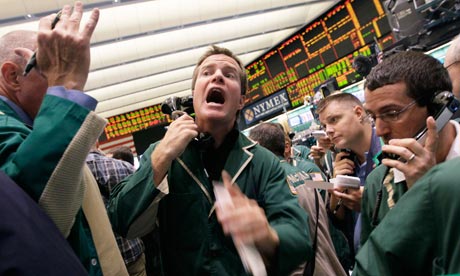| |
| |
|
| |
|
| |
|
Duyurular |
|
AKIL IÇIN YOL BIRDIR
(THERE IS but
ONE WAY for REASON)

(linkleri SAG TIKLAYIN lütfen)
Sn.Soner YALÇIN'dan dikkate değer bir yazı: Edebiyatla Ahmaklaştırma https://www.sozcu.com.tr/ 2021/yazarlar/soner-yalcin /edebiyatla-ahmaklastirma -6335565/
Önerdigimiz sayfalar:
M. SAID ÇEKMEG?L
anisina
|
|
|
|
Anasayfa  Medyadan Seçmeler Medyadan Seçmeler  How credit ratings agencies rule the world How credit ratings agencies rule the world
|
|
How credit ratings agencies rule the world |

|

|

|
|
Yazar Patrick Kingsley- The Guardian, Wednesday 15 February 2012
|
|
30-01-2013 |
|
How credit ratings agencies rule the world
Britain's credit rating took a knock this week,
when Moody's expressed a 'negative outlook' for the national economy. But who
are the mysterious agencies who take it upon themselves to grade everything
from countries to corporations – and how much power do they really
wield?

Patrick
Kingsley
The Guardian, Wednesday 15 February 2012 20.00
GMT
Jump to comments (…)

Traders in New York. A downgrade from one of the Big Three credit
ratings agencies can send markets into a panic. Photograph: Mary
Altaffer/AP
"Thank you for calling Moody's," says the automated voice. "Your call may
be recorded for quality purposes. If you would like a rating, press one." I
press one. There is a brief musical interlude. "Hello, Moody's," says another
voice, eventually. "What rating would you like?"
As you may have deduced, I am on the phone to Moody's Investors
Service. Along with Fitch, and Standard & Poor's (S&P), Moody's are
one of the Big Three credit ratings agencies. They sound like a trio of
preppy clothing companies, but in fact they are some of the most powerful
players in world finance. Specifically, they rate the "creditworthiness" of
companies and currencies. In the process, it is hoped that they give
investors an idea which investments are safest to make.
"Hello, Moody's!" I say. "I would like to know the rating for UK sovereign
debt." It's a topical question. The eurozone crisis has seen countries' ratings
fall across the continent. Chancellor George Osborne has staked his reputation
on helping the UK avoid the same fate. My adviser will ideally come back to me
with three particular letters: AAA. This is the highest rating Moody's offers.
Then comes AA1, and the scale goes down to C. Anything below BBB is known as
"junk".
"The UK has a rating of AAA," says Ms Moody. But then comes the
hammer-blow: "We also have a negative outlook for the UK." This negative
outlook – which Moody's announced on Monday – isn't quite AA1, but it's the
preamble to it. The lower their outlook, the more likely Moody's thinks the
UK government is to default on its debts – and the less likely it is that
people such as me will want to lend it money. The lenders that do remain
will be more nervous about the prospects of getting their money back –
and so they'll charge higher interest rates. And the higher the interest
rates, the steeper the government's debt repayments, and the more likely
it is to default. And so it goes on.
It is an Escherian cycle, and one in which the credit ratings agencies –
many argue – play too powerful a role. "I am no fan of conspiracy theories,"
said Rainer Bruederle, a former German economic minister, after S&P
threatened to downgrade 15 EU countries in December, "but sometimes it is hard
to dismiss the impression that some American ratings agencies and fund
managers are working against the eurozone." But Europeans aren't the only
ones up in arms. "S&P has shown really terrible judgment and they've
handled themselves very poorly," said US treasury secretary Timothy
Geithner after S&P downgraded America's AAA credit rating in August.
"They've shown a stunning lack of knowledge about basic US fiscal
maths."
The agencies say they're simply telling it like it is. After all,
the US congress spent most of last summer dithering about how to rescue the
American economy. All winter, European leaders have flip-flopped about how
to save the euro. Both quagmires, S&P argues, logically make it
likelier that the governments concerned will renege on their
debts.
More people would trust the agencies if they hadn't got so much so wrong so
recently. In 2009 Moody's issued a report titled "Investor fears over Greek
government liquidity misplaced"; within six months, the country was seeking a
bailout. Meanwhile, S&P's sovereign debt team miscalculated US debt by as
much as $2tn when it downgraded America's credit rating last August. Small
wonder the Independent called the team's then head – the mustachioed,
chain-smoking David Beers – "the most powerful man in the world that you've
never heard of".

Sub-prime mortage lending led to record numbers of foreclosures in the US.
Photograph: David Mcnew/Getty Images
As for their recent decisions, few believe that the agencies are wrong –
but some think they're wrong for speaking up. By highlighting the seriousness of
the situation, finance ministers argue the agencies are making things worse,
because of the cooling effect their downgrades have on investment. "The rating
agencies fuelled the crisis in 2008," raged Christian Noyer, the governor of
the Bank of France, in December, "and we can question whether they are not
doing the same thing in the current crisis."
Noyer's view highlights the paradoxical position ratings agencies find
themselves in. Today, they are said to be too quick to downgrade government
bonds. Five years ago, by contrast, they were too slow to downgrade the toxic
debt that caused the financial crisis. "During the sub-prime mortgage
crisis," says Larry Elliott, the Guardian's economics editor, "the ratings
agencies were very, very lax."
In layman's terms, the 2008 crisis started when thousands of US homeowners
stopped paying interest on their mortgage. The crisis spread because thousands
of bankers and fund-managers had foolishly backed those mortgages, and so lost
a lot of money themselves. They did this partly through their own lack of
foresight, but also because of the ratings agencies' failure to warn them of
the risks involved. In the run-up to 2008, a staggering proportion of
mortgage-based debts were rated AAA, when in fact they were junk. The same
goes for groups such as Enron, Lehman Brothers and AIG. Days before they went
bust, Moody's, S&P, and Fitch all still rated these failing companies as
safe investments. Shockingly, more than half of all corporate debt ever
rated AAA by S&P has been downgraded within seven years, according to
research by economist Sukhdev Johal.
Part of the problem is that ratings agencies are funded by the very
companies they rate. If you want to be rated, you must pay an agency between
$1,500 and $2,500,000 for the privilege, depending on the size of your
company. In theory, this creates a conflict of interest, because it gives the
agency an incentive to give the companies the rating they want. It could
explain why, for much of the past decade, agencies seemed happy not to
question either the risks banks were taking, or the accuracy of their
accounts. "We rely on audited statements," one senior analyst told
Alexandra Ouroussoff, an anthropologist who spent six years interviewing
people involved with credit ratings agencies. "We are hamstrung by audited
statements. If lying accountants sign off on a fiction ..." The analyst –
known as Jane – left the sentence unfinished, but her inference was clear:
the agencies are only as effective as their clients are
honest.
There is a flipside. On the one hand, it is claimed the agencies do not
deal robustly enough with the companies who pay them. On the other, it is said
they are too aggressive with the companies who don't. In 1998, Moody's wrote
to a German insurance giant called Hannover Re, according to research by the
Washington Post's Alec Klein. Though Hannover was not a client of Moody's, the
agency said that it had nevertheless decided to rate them free of charge.
Ominously, the agency hoped that in the future Hannover would be interested in
paying for the service itself. "We need to act," said Hannover's chairman,
Wilhelm Zeller.
Unfortunately, Hannover did not act soon enough. Moody's began rating
Hannover's debt status, but the insurance company had already enlisted the
services of S&P and AM Best (another, smaller agency). In 2003, Moody's
downgraded its debt to junk status, and because of the respect paid to
Moody's valuations, shareholders panicked, sold their stock, and Hannover Re
lost $175m (£111m) in an afternoon. Moody's declined to comment for the
Washington Post piece.
It's an example that highlights the power of the Big Three, who
collectively rate around 95% of debt. "They have built up such a franchise,"
Zeller told the newspaper, "it's difficult, if not impossible, to do anything
against it." There are more than 150 ratings agencies worldwide, but in order
to have any credibility, companies really need at least one of Moody's,
S&P and Fitch on their side, and preferably all three. The first two
firms each control around 40% of the market. Fitch has about 15%, and is
usually engaged when S&P and Moody's disagree significantly about the
creditworthiness of a debt. This generally happens because S&P measures
how likely a debtor is to default, whereas Moody's rates how long the
default is likely to last.
A former Lehman Brothers employee leaves the office after the bank
filed for bankruptcy in 2008. Photograph: Rex Features.
It wasn't always like this. At the beginning of the 20th century, there
were no ratings agencies, and very few ways of telling which of the many
emerging securities were worth investing in. There was a gap in the market, and
the first person to fill it was a Wall St errand boy called John Moody. In
1900, aged 32, he published Moody's Manual of Industrial and Miscellaneous
Securities, a compendium of information on thousands of financial
institutions. The book sold out in months, and an industry was born. Poor's
Publishing Company (the predecessor to S&P) emerged in 1916, Fitch in
1924.
Until the 1980s, the Big Three were still primarily North America-based,
and demand for their services was not high. This was because they rated the
debt markets, whereas at that time companies still did half their borrowing
from banks, and invested in things in which they had personal knowledge. "In
the old days, few bothered to engage a credit ratings agency because they
dealt with what they knew," writes Ha-Joon Chang, a heterodox (or leftwing)
economist and author of 23 Things They Don't Tell You About Capitalism.
"Banks lent to companies that they knew or to local households, whose
behaviours they could easily understand, even if they did not know them
individually. Most people bought financial products from companies and
governments of their own countries in their own currencies." But from the 80s
onwards, as the financial system became more deregulated, companies started
borrowing more and more from the globalised debt markets, and so the opinion
of the credit ratings agencies became more and more relevant. All three
agencies are still headquartered in America, but they now have offices in
hundreds of countries, thanks to the rapid expansionist tactics Hannover Re
experienced at first hand.
For countries such as Britain, the USA and France, the threat of a
downgrade is not as serious as it has been for other European countries.
Moody's negative outlook did not hit the pound or government bond prices hard,
and the FTSE 100 was affected only slightly. Even if Britain's rating fell to
AA1, the state is unlikely to be seriously affected because most other
countries are in the same boat, and investors have to put their money
somewhere. "In this respect, AAB is like the new triple-A," says Heather
Stewart, economics editor for the Observer.
But in many other areas of the financial system, the agencies still wield
tremendous power – power that many believe needs more regulation. "The obvious
solution would be to take this public service into public hands," Aditya
Chakrabortty has argued in these pages. "Let's have a ratings agency run by the
UN, funded by pooled contributions from both lenders and borrowers ... Let's
make the ratings business a utility, rather than a semi-cartel that
intimidates elected politicians and rakes in excess profits. It's time to
break up the bullying double-act."
Others are more pessimistic about the effect regulation could realistically
have. "Whether [or not] an intentional masking of risk by analysts was a
significant factor in precipitating the banking crisis ... the focus on
irresponsibility serves to deflect attention from the more important question:
the question of the accuracy of the risk-modelling techniques," writes
Ouroussoff, who is also the author of Wall Street at War. In other words, the
problem posed by credit ratings agencies lies not so much in their alleged
malpractice or negligence, but in the sheer impossibility of rating
creditworthiness in the first place. It's a problem that derives from the
difference between quantifying risk and predicting uncertainty. Credit ratings
agencies aren't bad at doing the former; at calculating, through mathematical
formulas, the statistical likelihood of, say, more than 5% of homeowners
defaulting on their mortgage. But they're arguably bad at doing the latter; at
predicting the unpredictable, or anything that can't be included within a
statistic: the possibility, for example, that vast swaths of the banking
industry might, through sheer stupidity, have handed out mortgages to people
who couldn't possibly pay them back.
• This article was amended on 16 February 2012. The original stated that:
Anything at or below BBB is known as "junk". This has now been
corrected. Sadece kayıtlı kullanıcılar yorum yazabilirler.
Lütfen hesabınıza giriş yapınız veya kayıt olunuz. Powered by AkoComment 2.0! |
|
Son Güncelleme ( 30-01-2013 )
|
|
|
|
|
|
|
Kullanıcı Girişi |
| L O G I N |  |
|---|
|
|
Ziyaretçi Sayısı |
|
147615909 Ziyaretçi
|
|
|
|